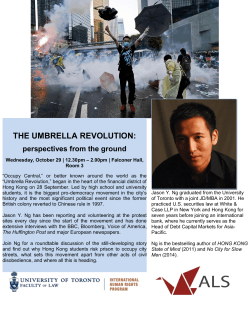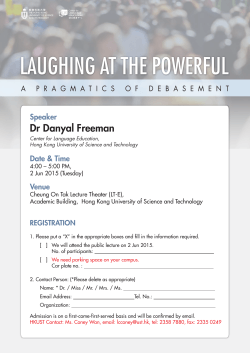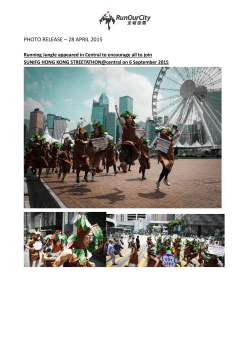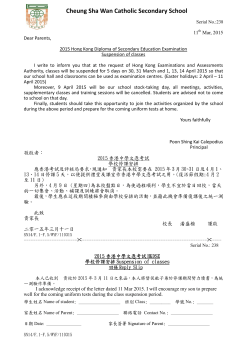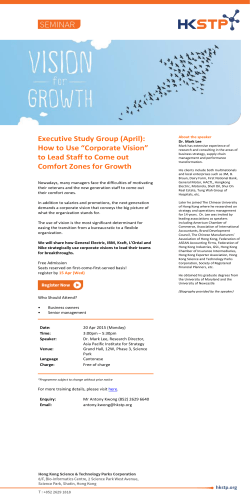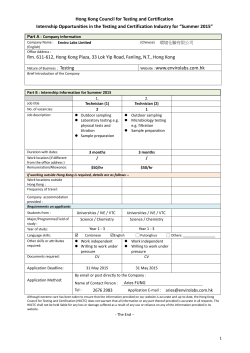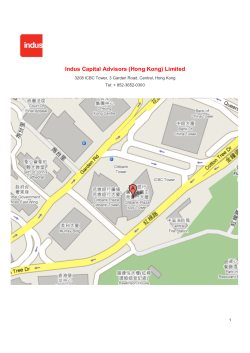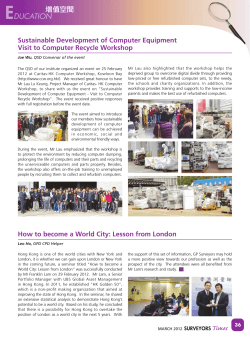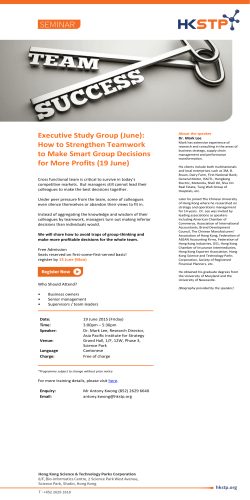
Report on Study of Road Traffic Congestion in Hong Kong
Report on Study of Road Traffic Congestion in Hong Kong (A letter submitted to Prof. Anthony Cheung, Secretary for Transport and Housing on 20th March 2015) We are writing in response to the Report on Study of Road Traffic Congestion in Hong Kong submitted by the Transport Advisory Committee (TAC) to the Secretary for Transport and Housing (STH) in December 2014. The Chartered Institute of Logistics and Transport in Hong Kong (CILTHK) welcomes the TAC initiatives to resolve the increasing traffic congestion problems in Hong Kong and considers that measures recommended by the TAC are in the right direction. Nevertheless, we suggest that incentive measures as against penalty means should be given more weight in the package of measures to be considered. We also support early government action in forestalling further deterioration of the congestion problems and strongly suggest the STH To launch a public engagement exercise to attract more public attention and solicit their support on the implementation of measures; To prioritise the measures according to their effectiveness and public acceptability; and To establish a special team to closely monitor the implementation of the measures to keep up the momentum and to make adjustments as required. Details of our comments are attached for your reference. The Chartered Institute of Logistics and Transport in Hong Kong 7/F Yue Hing Building | 103 Hennessy Road | Wanchai| Hong Kong T +852 2866 6336 | F +852 2866 6118 | E [email protected] | W www.cilt.org.hk General Comments The increasing congestion problems are felt in general by people in Hong Kong, with the lengthened journey time, reduction in average journey speeds, noticeable increase in the number of private car ownership and limited road construction in the past years. TAC's recommended measures in tackling traffic congestion in Hong Kong are well supported and considered to be in the right direction. The Chartered Institute of Logistics and Transport in Hong Kong (CILTHK) also supports the need for taking immediate steps to ease the traffic congestion problems to forestall the deterioration of the problems to bring in adverse impacts to our economy and livelihood. The CILTHK, however, has the following comments on the general aspects of the report and recommendations : It is believed that no one single factor would be effective in tackling the congestion problems. A holistic approach covering both supply and demand sides should be adopted. While curbing the vehicles on the road is important to resolve the congestion problems, the transport needs of the travelling public should be well taken care of. It is noted that some important measures such as improvement on the public transport system, managing road use, etc., are placed under on-going efforts by the government. The CILTHK considers such efforts should be enhanced and be given suitable emphasis in the holistic approach. An extensive education campaign and public engagement exercise should be launched for focused public attention and appreciation of the proposed measures. The development of a strategy based on packages of measures may be considered. This is particularly important in the education and publicity aspects to enable the general public to fully appreciate the magnitude of the problems and the inter-relationship of the recommended measures. Periodic reviews would be needed to monitor the effectiveness of the measures and make adjustments as required. The recommended measures focused much on tackling the ownership issues. While the growth in private car ownership is alarming, it is the utilisation of vehicles on the roads, in particular in busy business and shopping centres, which should be the focus of actions. The measures proposed are noted to be mostly on the "penalty" side, the CILTHK considers that the more effective means should be a "carrot and stick" approach, with incentives to be given to motorists and traders to adopt measures to avoid the busy corridors or the congested periods. The Chartered Institute of Logistics and Transport in Hong Kong 7/F Yue Hing Building | 103 Hennessy Road | Wanchai| Hong Kong T +852 2866 6336 | F +852 2866 6118 | E [email protected] | W www.cilt.org.hk Flexibility needs to be considered in adopting the measures. It is important to differentiate the priority areas and time periods for the implementation of the congestion measures. Not all areas are busy traffic zones and even in the busy areas, not all time periods need to be tackled. For instance, holiday traffic in Central would not be a problem. To ease political objections and demonstrate that the financial disincentives are not implemented to boost up the government revenue, consideration may be given to set up a fund with the financial penalties for use in measures tackling traffic issues or for the provision of transport infrastructure. The CILTHK agrees that continued provision of major transport infrastructure may not be effective nor long-lasting taking into account the site constraints. Consideration should be given to optimise the existing road capacities through traffic management and other measures. The CILTHK also notes that land use planning and transport issues have close links to one another. Thus, better land use planning for mixed land use development, with priority given to public transport system, adequate provision of transport facilities, such as transport interchanges, loading / unloading / parking facilities, etc., would help resolve potential traffic problems. Other measures, such as advocation of staggered or flexi working hours to spread out and thus ease the traffic problems at peak hours, encouragement on the use of technology to reduce needs for trips, etc., may also be of help. Specific Comments On-going Measures We support the government action in expanding and improving pedestrian facilities such as the provision of hillside escalator links and elevator systems to promote walking as a transport mode for short distance trips, as well as the provision of elevated walkway linking various developments and transport facilities. Provision of barrier-free facilities would help enhance convenient and comfort of the walkway systems and hence their utilisation. This in a way will help improve road capacity and safety. We support in general improvement to the public transport system and the rationalisation of public transport services. More efforts should be taken to enhance the interchange concept within and between modes, and the provision of priority measures to facilitate bus movements on the roads for the benefits of majority of road passengers. The Chartered Institute of Logistics and Transport in Hong Kong 7/F Yue Hing Building | 103 Hennessy Road | Wanchai| Hong Kong T +852 2866 6336 | F +852 2866 6118 | E [email protected] | W www.cilt.org.hk While local traffic management schemes would help resolve local traffic problems, action should also be taken to review traffic pattern on an area basis and initiate large-scale traffic management schemes to improve traffic movements and road junction capacity. We also support the early implementation of the alignment of the tolls of the three harbour crossings to optimise their utilisation. We support the use of technology for better dissemination of traffic information to road users and better co-ordination of traffic movements. Unregulated kerbside activities are reducing the usable space of the carriageways and causing traffic bottlenecks. As the inside lane is occupied by illegal parking and waiting vehicles, loading / unloading activities are forced to take place in the second land, rendering only one lane left for through traffic in a three-lane carriageway. We suggest the setting up of traffic control centres and traffic response teams on major corridors to monitor the traffic conditions realtime and clear up blockages with minimal time loss, in the same manner as those in tunnels and bridges. While we appreciate the use of road excavation permits to better manage and coordinate road works to reduce time loss, we consider monitoring of road works would also be of importance for early re-opening of roads. As a long-term measure, consideration should be given to provide some underground ducting system to reduce the needs for road opening as far as possible, in particular in new development areas. The TAC Recommendations Raise PC's First Registration Tax (FRT) and Annual Licence Fees (ALF) and tighten up standards for EFPPCs - We support mild increases in the FRT and ALF to regulate the demand for private cars. We also note that the increase in the FRT in 2011 was proved to be ineffective in view of the concessions given to the EFPPCs. We support in general the tightening of the standards for EFPPCs, bearing in mind the objective of the concessions to EFPPCs is to encourage replacement of old vehicles to reduce pollution problems and not to encourage more car ownership. Congestion charging pilot scheme - The CILT support the "user pays principle" in charging motorists for entering some strategic locations during traffic peak hours. The pilot scheme in Central should be implemented as early as possible to test the effectiveness of the scheme. Increase meter parking charges - We support in general measures curbing road side parking. The current charges for meter parking on street are on the low side and this needs to be reviewed. We propose that there should be different charges for different places and different times of the day to allow flexibility to reflect the traffic and utilisation pattern. The Chartered Institute of Logistics and Transport in Hong Kong 7/F Yue Hing Building | 103 Hennessy Road | Wanchai| Hong Kong T +852 2866 6336 | F +852 2866 6118 | E [email protected] | W www.cilt.org.hk Stringent penalty and enforcement of traffic offences - We support enhancement in publicity and education efforts to promote compliance with traffic rules and regulation but considers it important to place sufficient resources and efforts in enforcement. Notorious areas of traffic problems should be given priority in the overall enforcement strategy. In order to have continuous deterrence effect, similar to red light and speeding, surveillance technology should be explored not only to streamline the enforcement process but also to bring about persistent enforcement effects. Review parking policy - We support a review to be conducted on parking policy. As rightly pointed out in the report, an optimum level of parking provision has to be identified. Non-provision of parking spaces, in particular in business and industrial centres, would not be a right way to suppress car usage. Encourage on-street loading and unloading outside peak hours - Measures should be taken to provide incentives rather than penalties to encourage operators and traders to carry out the loading and unloading activities outside peak hours. 20th March 2015 The Chartered Institute of Logistics and Transport in Hong Kong 7/F Yue Hing Building | 103 Hennessy Road | Wanchai| Hong Kong T +852 2866 6336 | F +852 2866 6118 | E [email protected] | W www.cilt.org.hk
© Copyright 2026
